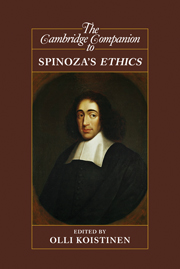Book contents
- Frontmatter
- Introduction
- 1 The Textual History of Spinoza’s Ethics
- 2 The Geometrical Order in the Ethics
- 3 Spinoza’s Ontology
- 4 Substance Monism and Identity Theory in Spinoza
- 5 Spinoza and the Stoics on Substance Monism
- 6 Spinoza on Necessity
- 7 Knowledge in Spinoza’s Ethics
- 8 Spinoza on Action
- 9 The Anatomy of the Passions
- 10 Freedom, Slavery, and the Passions
- 11 Spinoza’s Theory of the Good
- 12 The Power of Reason in Spinoza
- 13 Spinoza on the Essence of the Human Body and the Part of the Mind That Is Eternal
- Bibliography
- Index
4 - Substance Monism and Identity Theory in Spinoza
Published online by Cambridge University Press: 28 March 2010
- Frontmatter
- Introduction
- 1 The Textual History of Spinoza’s Ethics
- 2 The Geometrical Order in the Ethics
- 3 Spinoza’s Ontology
- 4 Substance Monism and Identity Theory in Spinoza
- 5 Spinoza and the Stoics on Substance Monism
- 6 Spinoza on Necessity
- 7 Knowledge in Spinoza’s Ethics
- 8 Spinoza on Action
- 9 The Anatomy of the Passions
- 10 Freedom, Slavery, and the Passions
- 11 Spinoza’s Theory of the Good
- 12 The Power of Reason in Spinoza
- 13 Spinoza on the Essence of the Human Body and the Part of the Mind That Is Eternal
- Bibliography
- Index
Summary
Spinoza is famous - or rather notorious - for his contention that there is only one substance, namely God. Everything else is but a mere property of this substance, that is, a property of God. Spinoza presents this view in 1p14: 'Except God, no substance can be or be conceived'. Now, it is certainly an interesting question whether or not the proof that Spinoza adduces for this claim is valid. But even if it is, the reader may still be at a loss. For the premises of this proof are by no means evident or uncontroversial. No shrewd Aristotelian or Cartesian would have any trouble denying their truth and replacing them with other principles more suitable for their own purposes. So the question about Spinoza's motive for his substance monism still remains. One might approach the question by pointing out that in his Principia Philosophiae Descartes defines 'substance' in such a way that only God could possibly be a substance in the strict sense. Descartes, however, is unwilling to draw the conclusion that there is after all only one substance. He instead maintains the ambiguity of the term 'substance'; in a weaker sense it can just as well be applied to creatures of God, viz., to res cogitans and res extensa, both of which depend on nothing apart from God.
- Type
- Chapter
- Information
- The Cambridge Companion to Spinoza's Ethics , pp. 79 - 98Publisher: Cambridge University PressPrint publication year: 2009
- 6
- Cited by

